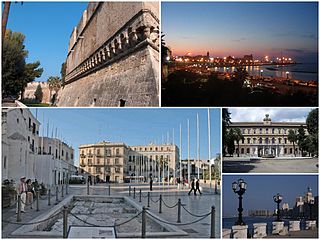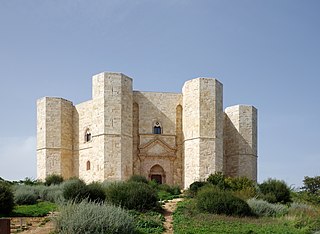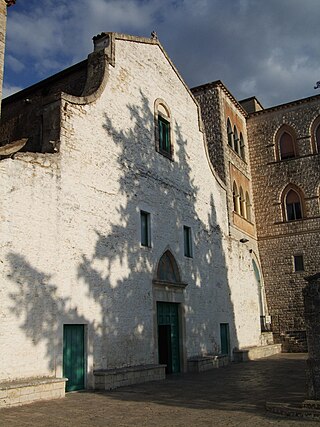
Bari is the capital city of the Metropolitan City of Bari and of the Apulia region, on the Adriatic Sea, southern Italy. It is the second most important economic centre of mainland Southern Italy after Naples. It is a port and university city, as well as the city of Saint Nicholas. The city itself has a population of 315,284 inhabitants, over 116 square kilometres (45 sq mi), while the urban area has 750,000 inhabitants. The metropolitan area has 1.3 million inhabitants.

Andria is a city and comune in Apulia. It is an agricultural and service center, producing wine, olives and almonds. It is the fourth-largest municipality in the Apulia region and the largest municipality of the Province of Barletta-Andria-Trani. It is known for the 13th-century Castel del Monte.

Regola is the 7th rione of Rome, Italy, identified by the initials R. VII, and belongs to the Municipio I. The name comes from Arenula, which was the name of the soft sand that the river Tiber left after the floods, and that built strands on the left bank.

Minervino Murge is a town and comune, former bishopric and present Latin Catholic titular see in the administrative province of Barletta-Andria-Trani in the region of Apulia in southern Italy, lying on the western flank of the Murgia Barese mountain chain.

Cassano delle Murge is a town and comune in the Metropolitan City of Bari, Apulia, southern Italy.
Fulvia, an ancient Latin woman's name, may refer to:

The Archdiocese of Trani-Barletta-Bisceglie is a Latin Church ecclesiastical territory or archdiocese of the Catholic Church in Italy in the province of Barletta-Andria-Trani in Apulia. Formerly a metropolitan see, in 1980 it became a suffragan archdiocese in the ecclesiastical province of the metropolitan Archdiocese of Bari-Bitonto. It received its current name in 1986, when the Archdiocese of Trani added to its title the names of two suppressed dioceses merged into it.

The Archdiocese of Bari-Bitonto is Metropolitan Latin archdiocese of the Catholic Church in the administrative Bari province, Puglia (Apulia) region, southeastern Italy, created in 1986, when the historical diocese of Bitonto was subsumed in the Archdiocese of Bari.
Nicola Gliri, called in Latin Nicolaus Glirus, was an Italian Baroque painter active in the region of Apulia.
The following is a timeline of the history of the city of Bari in the Apulia region of Italy.
The following is a timeline of the history of the city of Taranto in the Apulia region of Italy.
The following is a timeline of the history of the city of Reggio Calabria, Italy.
The following is a timeline of the history of the city of L'Aquila in the Abruzzo, a region of Italy.
Vito Carmelo Colamonico was an Italian geographer, geologist and scholar. His works include studies on some karst dolines and landforms of Italy, such as Pulo di Altamura, Pulicchio di Gravina and Gurio Lamanna.

Ottavio Serena was an Italian politician, judge, prefect and historian. He is known in his hometown Altamura for his works about local history, such as the Altamuran Revolution (1799). His contribution and the testimonies he collected allowed to shed light on some historical events (such as the killing of Giovanni Firrao and on legendary toponyms.
Angela Bianca Tragni is an Italian journalist and writer. Over her career, she carried out research in the culture of the Italian region Apulia and folklore of Southern Italy. She also wrote books on history, especially the Middle Ages.

Angela Masi is an Italian politician affiliated with the Five Star Movement. She began her term in the Chamber of Deputies on 23 March 2018.
Luigi Nicola Riserbato is an Italian politician.

The Arianese dialect, typical of the territorial area of Ariano Irpino, is a vernacular variety of the Irpinian dialect, belonging in turn to the Neapolitan group of southern Italian dialects. Like all Romance languages, it descends directly from Vulgar Latin, a language of Indo-European stock that has been widespread in the area since Roman times.

The culture of Apulia, the region that constitutes the extreme southeast of the Italian peninsula, has had, since ancient times, mixed influences from the West and the East, due to its strategic position near the transition zone between these two cultural regions. Its location, on the west coast of the Adriatic and Ionian seas, the natural southern border between Western Europe and the Balkans and Greece, made it a bridge to the East since antiquity, and in the Middle Ages, it was a cultural frontier between the Roman-Germanic West and the Greek-Byzantine East.












